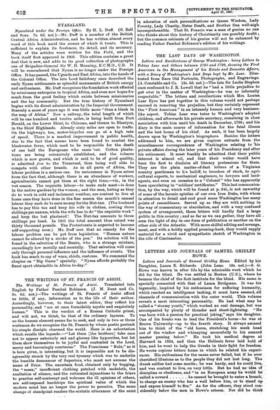NYASALAND.
Nyasaland under the Foreign Office. By H. L. Duff. (G. Bell and Sons. Is. 8d. net.)—Mr; Duff is a member of the British Central Africa Administration, and he has written almost every word of this book amid the scenes of which it treats. This is sufficient to explain its freshness, its detail, and its accuracy. Many of the articles were written for the Field, and the book itself first appeared in 1903. This edition contains a great deal that is new, and adds to its good collection of photographs one of Brigadier-General. Sir W. H. Manning, K.C.M.G, C.B. It will be remembered that Nyasa is no longer under the Foreign Office. It has passed, like Uganda and East Africa, into the hands of the Colonial Office. The late Lord Salisbury once described the early Nyasa settlements as splendid monuments of British energy and enthusiasm. Mr. Duff recognises the foundation work effected by missionary enterprise in tropical Africa, and even now hopes for much from the good feeling which exists between missionaries and the lay community. But the true history of Nyasaland begins with its direct administration by the Imperial Government. Scarcely a score of years ago it was little more "than a blank in the map of Africa." Now a railway, the total length of which will be one hundred and twelve miles, is being built from Port Herald, on the Lower Shire, to Chiromo, and thence to Blantyre, in the Shire Highlands. Already sixty miles are open to traffic. On the highways, too, motor-bicycles can go at a high rate of speed. There is a marked improvement in public health, due to the fact that means have been found to combat the blackwater fever, which used to be responsible for the death of one half the Europeans who came 'out. Cotton planta- tions are being extensively established, and the tobacco which is now grown, and which is said to be of good quality, is admitted free to the Transvaal, thus being well able to compete with other brands. As in all parts of Africa, the labour problem is a serious one. Its seriousness in Nyasa arises from the fact that, although there is an abundance of workers, agriculturists cannot get them at the right time,—viz., in the wet season. The requisite labour—to make ends meet—is done in the native gardens by the women ; and the men, hating as they do to work in cold and inclement weather, are content to live at home once they have done in the fine season the month's annual labour they each do to earn money for the Hut-tax. (The husband has to pay this tax and keep his wife in clothes, coating three shillings per annum, while the wife has to do " the requisite work " and keep the but plastered ! The Hut-tax amounts to three shillings per head. In 1901 the total amount thus raised was thirty thousand pounds. The Protectorate is expected to become self-supporting soon.) Mr. Duff sees that no remedy for the labour problem can be got from legislation. "Human nature cannot be altered by a stroke of the pen." Its solution will be found in the salvation of the Bantu, who is a strange mixture, exceedingly low morally and mentally. That salvation will come only through personal influence and the influence of events. The book has much to say of wars, chiefs, customs. We commend the chapter on "Big Game" specially. "Nyasa affords probably the finest sport obtainable in Africa to-day."


























































 Previous page
Previous page